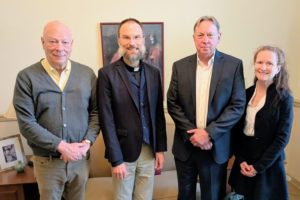
In an effort to tackle the growing challenges of misinformation and disinformation in today’s digital age, the Council on Library and Information Resources (CLIR) has announced the release of the trailer for its highly anticipated new media literacy podcast, “For Your Reference” (FYR). With an impressive team of co-producers and hosts, this initiative aims to empower the public with the critical skills needed to discern fact from fiction in the digital realm.
CLIR’s FYR podcast, set to debut on November 14, promises to be a game-changer in the realm of media and information literacy. Co-produced by Stacey Patton and Robin A. Bedenbaugh, Associate Director for the University of Tennessee Press, FYR will offer viewers a fresh perspective on the world of information.
Paris Whalon, Student Success Librarian for Media Literacy at the University of Tennessee, Knoxville, and Joshua Ortiz Baco, Digital Scholarship Librarian at the same institution, will join Bedenbaugh as co-hosts for this groundbreaking podcast.
“At a time when misinformation and disinformation are increasingly plaguing society, there’s a growing call for solutions. Rather than merely exacerbating the issue, increased access to information and technology has made it more challenging,” says Bedenbaugh.
With a mission to address this critical concern, FYR is dedicated to enhancing media and information literacy. The podcast will focus on timely topics, featuring guest scholars and librarians as guides to help the audience not only understand these topics but also learn how to access credible information sources on these subjects.
Misinformation and disinformation disproportionately affect marginalized communities, who often find themselves both as targets of public debates and as the least equipped to participate in them. The FYR podcast recognizes the importance of taking proactive steps to combat this growing issue and emphasizes the role of libraries, archives, museums, and galleries (GLAMs) in the process.
CLIR’s FYR podcast operates on the premise that these institutions must actively seek to initiate change. Their aim is to consolidate the reputation of GLAMs as guardians of the truth, offering critical context to local, regional, and national narratives. They also plan to highlight individual institutions that preserve, protect, and provide access to the raw materials of our collective stories.
Media Literacy Now conducted a survey in 2022, revealing that a majority of adults in the United States received no education in media literacy during their high school years. The survey pointed out significant gaps in the ability to analyze information sources and the messages they contain. Only 38% of those surveyed had the opportunity to reflect on messaging through advertising and TV programs in high school.
This deficit in media literacy is what CLIR’s FYR podcast seeks to address. By building trust in librarians and other information professionals, FYR aims to position GLAMs as an essential part of the media ecosystem, helping to navigate the ever-evolving landscape of information.
“For Your Reference” emerges as a vital solution to a pressing problem in society today. The podcast promises to fill the gaps in media literacy education, offering a valuable resource for individuals looking to critically assess and navigate the sea of information they encounter daily.
The first episode is set to release on November 14, and it is expected to make a significant impact on the way people approach information in the digital age. Stay tuned for an exciting journey into the world of media and information literacy with FYR, as it equips individuals to distinguish fact from fiction in an ever-evolving digital landscape.
To watch the trailer click the video below.

Council on Library and Information Resources
1800 Diagonal Road, Suite 600
Alexandria, VA 22314
contact@clir.org
CLIR is an independent, nonprofit organization that forges strategies to enhance research, teaching, and learning environments in collaboration with libraries, cultural institutions, and communities of higher learning.
Unless otherwise indicated, content on this site is available for re-use under CC BY-SA 4.0 License